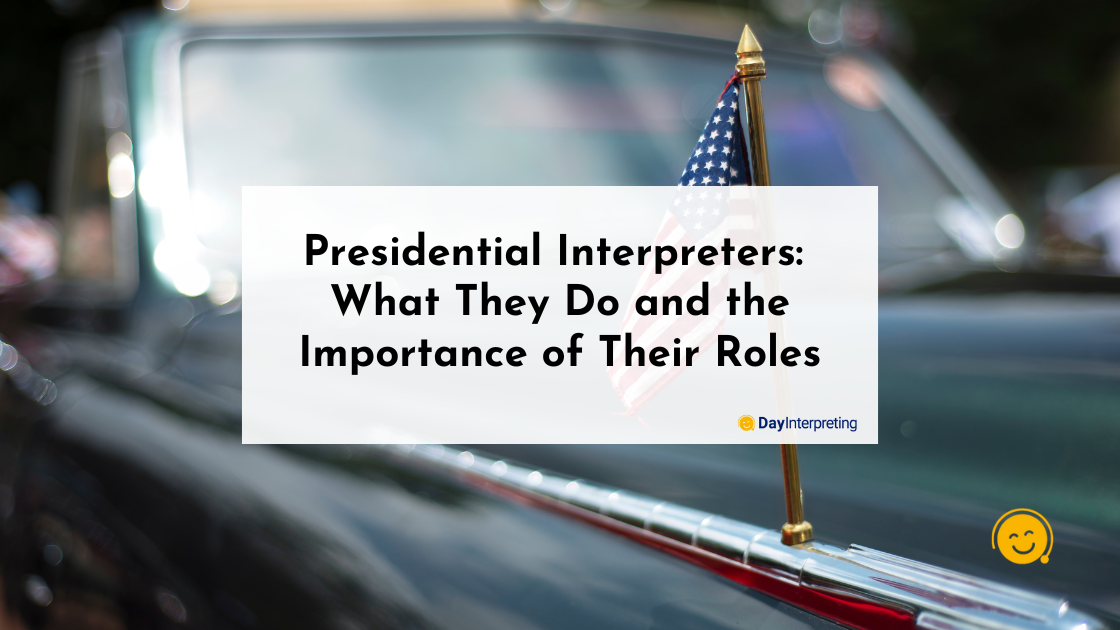Presidential Interpreters are an integral part of diplomatic and political communication. Their role is to ensure effective communication between the President of the United States and another foreign leader, dignitaries, and others who need to speak English fluently. Interpreters are responsible for interpreting speeches, meetings, and conversations during international events and negotiations. The role of a Presidential Interpreter is challenging and requires excellent language skills, knowledge of international affairs, and cultural awareness.
In this post, we explore the ins and outs of this language service provider, how they bridge the language gap, and why they are present at pivotal moments involving American presidents.
Why are Presidential Interpreters so Important?
The primary role of a Presidential Interpreter is to interpret the spoken word accurately and convey the intended meaning of the speaker. This requires the interpreter to have advanced language skills in both English and the language they are interpreting. Interpreters must be able to interpret not only words but also the nuances of language, including tone, inflection, and cultural context. The interpreter must be able to accurately convey the intended meaning of the speaker, ensuring that everything is preserved and correctly represented in translation.
Interpreters also play an essential role in diplomacy and international relations. They are often present during high-level meetings and negotiations between heads of state or diplomats. Interpreters must be able to convey complex ideas and concepts accurately, often in high-pressure situations. A Presidential Interpreter’s role in diplomacy is crucial, as a misinterpreted word or phrase can have significant consequences and potentially damage diplomatic relations between countries.
The Role of Interpreters in Diplomatic and Political Communication
These interpreters must be knowledgeable about international affairs, politics, and cultural differences. They must be able to interpret complex political speeches and understand the nuances of diplomatic language. Sign language interpreters must also assist world leaders to facilitate communication, both within the state department’s office and at press conferences. Interpreters must also be aware of cultural differences and potential misunderstandings that could arise from different cultural backgrounds.
In addition to interpreting spoken language, these interpreters may also be responsible for interpreting written documents. For example, if the President receives a letter or document in a foreign language, the interpreter may be required to translate it accurately.
The importance of the Presidential Interpreter’s role cannot be overstated. Effective communication is essential in all aspects of diplomacy and international relations. Misunderstandings and miscommunications can occur without accurate interpretation, potentially causing damage to relationships between countries.
Skills and Knowledge Presidential Interpreters Need
Interpreters that work for the presidency require advanced language skills in both English and the language they are interpreting. They must have a deep understanding of the grammar, vocabulary, and nuances of the languages they are working with to deliver accurate language services. This allows them to accurately convey the intended meaning of the speaker and ensure that nothing is lost or misrepresented in translation. Interpreters must also be skilled in interpreting body language, tone of voice, and other non-verbal cues, which can be critical to understanding the speaker’s meaning.
In addition to language skills, Presidential Linguists must also possess knowledge of international affairs and politics. They must be familiar with the policies and positions of both the United States and other countries, as well as the cultural differences that can impact diplomatic communication. Interpreters must be able to interpret complex political speeches and understand the nuances of diplomatic language.
Cultural awareness is also a critical skill for these interpreters. They must be aware of cultural differences and potential misunderstandings that could arise from different cultural backgrounds. This includes knowledge of customs, traditions, and values, as well as an understanding of cultural norms and behaviors. Interpreters must be able to navigate cultural differences in a diplomatic setting, ensuring that communication is effective and respectful.
Final Thoughts on Presidential Language Interpreters
In conclusion, Presidential Interpreters play a crucial role in ensuring effective communication between the President of the United States and foreign leaders. Their role is challenging and requires advanced language skills, knowledge of international affairs, and cultural awareness. The importance of their role cannot be overstated, as accurate interpretation is essential for successful diplomacy and international relations.





0 Comments